Information injection-pump assembly
BOSCH
F 019 Z10 135
f019z10135
ZEXEL
107692-2110
1076922110
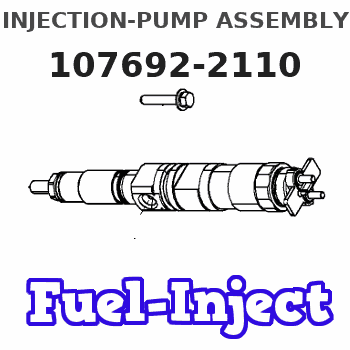
Rating:
Service parts 107692-2110 INJECTION-PUMP ASSEMBLY:
1.
_
5.
AUTOM. ADVANCE MECHANIS
7.
COUPLING PLATE
11.
Nozzle and Holder
12.
Open Pre:MPa(Kqf/cm2)
15.7{160}/21.6{220}
14.
NOZZLE
Include in #1:
107692-2110
as INJECTION-PUMP ASSEMBLY
Cross reference number
BOSCH
F 019 Z10 135
f019z10135
ZEXEL
107692-2110
1076922110
Zexel num
Bosch num
Firm num
Name
Calibration Data:
Adjustment conditions
Test oil
1404 Test oil ISO4113 or {SAEJ967d}
1404 Test oil ISO4113 or {SAEJ967d}
Test oil temperature
degC
40
40
45
Nozzle and nozzle holder
105780-8250
Bosch type code
1 688 901 101
Nozzle
105780-0120
Bosch type code
1 688 901 990
Nozzle holder
105780-2190
Opening pressure
MPa
20.7
Opening pressure
kgf/cm2
211
Injection pipe
Outer diameter - inner diameter - length (mm) mm 8-3-600
Outer diameter - inner diameter - length (mm) mm 8-3-600
Overflow valve
131424-8420
Overflow valve opening pressure
kPa
255
221
289
Overflow valve opening pressure
kgf/cm2
2.6
2.25
2.95
Tester oil delivery pressure
kPa
255
255
255
Tester oil delivery pressure
kgf/cm2
2.6
2.6
2.6
PS/ACT control unit part no.
407980-2
24*
Digi switch no.
17
Direction of rotation (viewed from drive side)
Left L
Left L
Injection timing adjustment
Direction of rotation (viewed from drive side)
Left L
Left L
Injection order
1-5-3-6-
2-4
Pre-stroke
mm
5.6
5.57
5.63
Beginning of injection position
Governor side NO.1
Governor side NO.1
Difference between angles 1
Cal 1-5 deg. 60 59.75 60.25
Cal 1-5 deg. 60 59.75 60.25
Difference between angles 2
Cal 1-3 deg. 120 119.75 120.25
Cal 1-3 deg. 120 119.75 120.25
Difference between angles 3
Cal 1-6 deg. 180 179.75 180.25
Cal 1-6 deg. 180 179.75 180.25
Difference between angles 4
Cyl.1-2 deg. 240 239.75 240.25
Cyl.1-2 deg. 240 239.75 240.25
Difference between angles 5
Cal 1-4 deg. 300 299.75 300.25
Cal 1-4 deg. 300 299.75 300.25
Injection quantity adjustment
Adjusting point
-
Rack position
13
Pump speed
r/min
700
700
700
Average injection quantity
mm3/st.
120.5
118.5
122.5
Max. variation between cylinders
%
0
-3
3
Basic
*
Fixing the rack
*
PS407980-224*
V
2.25+-0.
01
PS407980-224*
mm
3.6+-0.0
5
Standard for adjustment of the maximum variation between cylinders
*
Injection quantity adjustment_02
Adjusting point
Z
Rack position
7.5+-0.5
Pump speed
r/min
440
440
440
Average injection quantity
mm3/st.
15.5
13.7
17.3
Max. variation between cylinders
%
0
-15
15
Fixing the rack
*
PS407980-224*
V
V1+0.05+
-0.01
PS407980-224*
mm
5.5+-0.0
3
Standard for adjustment of the maximum variation between cylinders
*
Remarks
Refer to items regarding the pre-stroke actuator
Refer to items regarding the pre-stroke actuator
Injection quantity adjustment_03
Adjusting point
A
Rack position
R1(13)
Pump speed
r/min
700
700
700
Average injection quantity
mm3/st.
120.5
119.5
121.5
Basic
*
Fixing the lever
*
Boost pressure
kPa
36
36
Boost pressure
mmHg
270
270
PS407980-224*
V
2.25+-0.
01
PS407980-224*
mm
3.6+-0.0
5
Injection quantity adjustment_04
Adjusting point
B
Rack position
R1+1.55
Pump speed
r/min
1350
1350
1350
Average injection quantity
mm3/st.
114
110
118
Fixing the lever
*
Boost pressure
kPa
36
36
Boost pressure
mmHg
270
270
PS407980-224*
V
2.25+-0.
01
PS407980-224*
mm
3.6+-0.0
5
Boost compensator adjustment
Pump speed
r/min
250
250
250
Rack position
R2-1.3
Boost pressure
kPa
8
6.7
9.3
Boost pressure
mmHg
60
50
70
Boost compensator adjustment_02
Pump speed
r/min
250
250
250
Rack position
R2(R1-1.
3)
Boost pressure
kPa
22.7
22.7
22.7
Boost pressure
mmHg
170
170
170
0000001601
CU407980-224*
*
Actuator retarding type
*
Supply voltage
V
24
23.5
24.5
Ambient temperature
degC
23
18
28
Pre-stroke
mm
2.5
2.45
2.55
Output voltage
V
2.83
2.82
2.84
Adjustment
*
_02
CU407980-224*
*
Supply voltage
V
24
23.5
24.5
Ambient temperature
degC
23
18
28
Pre-stroke
mm
5.6
5.57
5.63
Output voltage
V
1.2
1
1.4
Confirmation
*
Remarks
Output voltage V1
Output voltage V1
_03
CU407980-224*
*
Supply voltage
V
24
23.5
24.5
Ambient temperature
degC
23
18
28
Output voltage
V
3.05
3.05
Confirmation of operating range
*
Test data Ex:
Governor adjustment
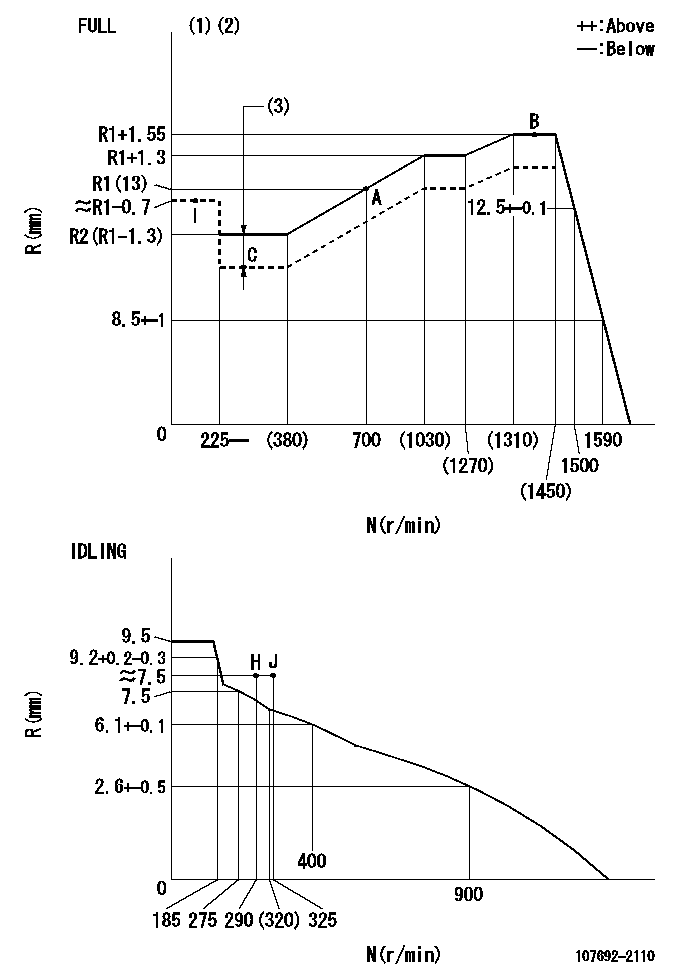
N:Pump speed
R:Rack position (mm)
(1)Torque cam stamping: T1
(2)Tolerance for racks not indicated: +-0.05mm.
(3)Boost compensator stroke: BCL
----------
T1=AC34 BCL=1.3+-0.1mm
----------
----------
T1=AC34 BCL=1.3+-0.1mm
----------
Speed control lever angle
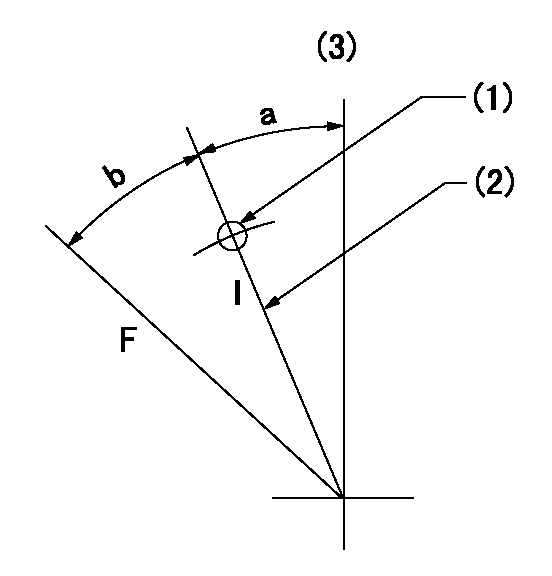
F:Full speed
I:Idle
(1)Use the hole at R = aa
(2)Stopper bolt set position 'H'
(3)Accelerator lever
----------
aa=38mm
----------
a=29deg+-5deg b=39deg+-3deg
----------
aa=38mm
----------
a=29deg+-5deg b=39deg+-3deg
Stop lever angle
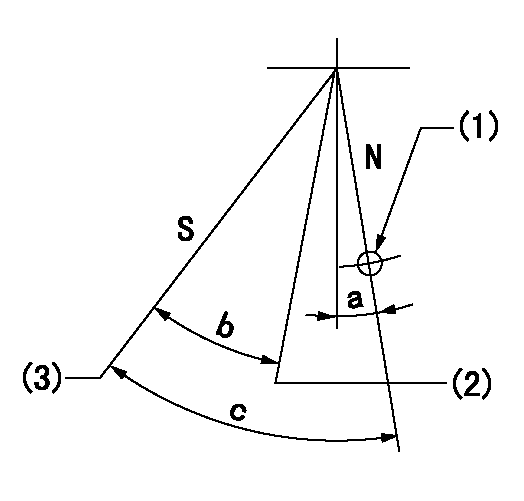
N:Pump normal
S:Stop the pump.
(1)Use the hole at R = aa
(2)Normal engine position (Rack position corresponding to bb)
(3)Set the stopper bolt at rack position = cc and speed = dd and confirm non-injection
----------
aa=47mm bb=17.4mm cc=3.5+-0.3mm dd=0r/min
----------
a=4deg+-5deg b=(31deg) c=41deg+-5deg
----------
aa=47mm bb=17.4mm cc=3.5+-0.3mm dd=0r/min
----------
a=4deg+-5deg b=(31deg) c=41deg+-5deg
0000001301
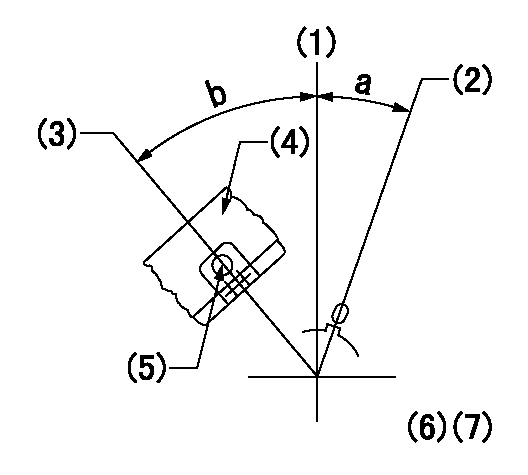
(1)Pump vertical direction
(2)Coupling's key groove position at No 1 cylinder's beginning of injection
(3)At the No 1 cylinder's beginning of injection position, stamp an aligning mark on the damper to align with the pointer's groove.
(4)Damper
(5)Pointer
(6)B.T.D.C.: aa
(7)Pre-stroke: bb
----------
aa=2deg bb=5.6+-0.03mm
----------
a=(0deg) b=(40deg)
----------
aa=2deg bb=5.6+-0.03mm
----------
a=(0deg) b=(40deg)
0000001401
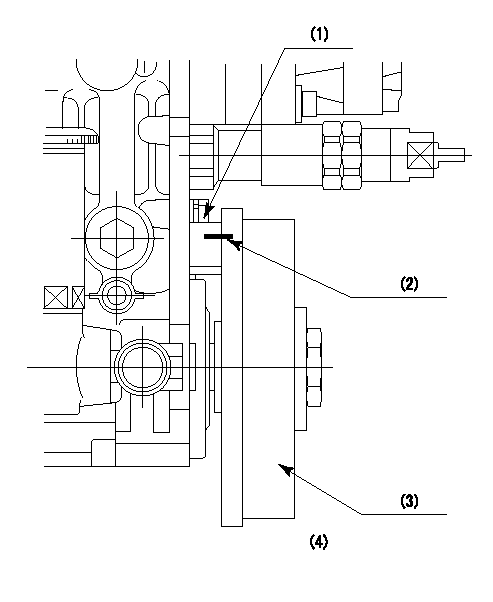
(1)Pointer
(2)Injection timing aligning mark
(3)Fly weight
(4)The actual shape and direction may be different from this illustration.
Operation sequence
1. Turn the prestroke actuator OFF.
2. Turn the camshaft as far as the No.1 cylinder's beginning of injection position.
3. Check that the pointer alignment mark of the injection pump and the alignment mark of the flywheel are matching.
4. If they are not matching, erase the alignment mark on the flywheel side, and stamp an alignment mark on the flywheel position that matches with the pointer side alignment mark.
5. Check again that the coupling's key groove position is in the No.1 cylinder's beginning of injection position.
----------
----------
----------
----------
0000001701
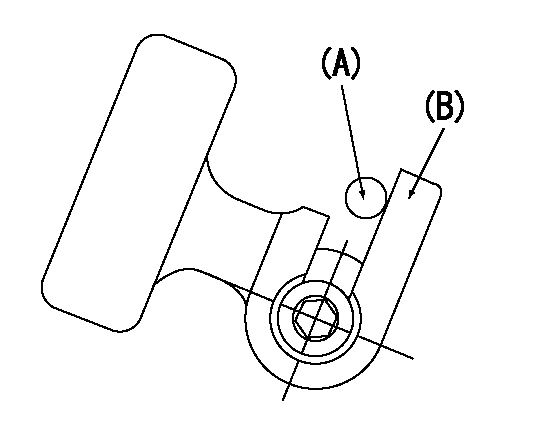
A : Stopper pin
B: Connector
----------
----------
----------
----------
0000001801
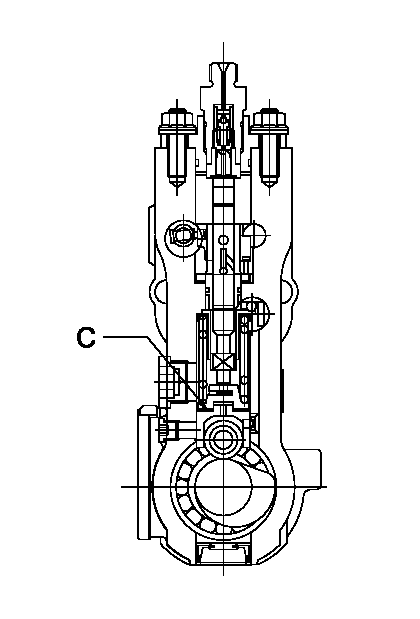
C:Shim
----------
----------
----------
----------
0000001901
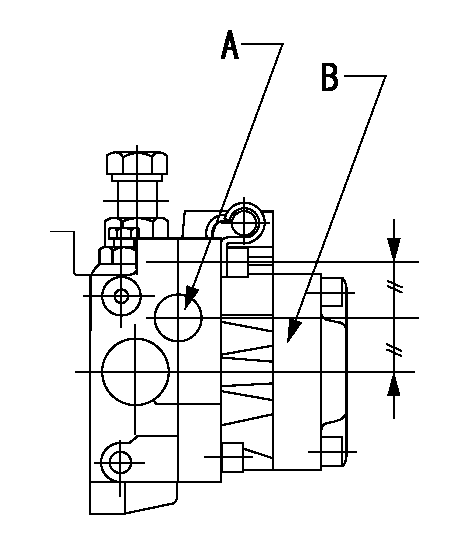
A:Sealing position
B:Pre-stroke actuator
1. When installing the pre-stroke actuator on the pump, first tighten the installation bolts loosely, then move the actuator fully clockwise (viewed from the drive side).
Temporary tightening torque: 1 - 1.5 N.m (0.1 - 0.15 kgf.m)
2. Move the actuator in the counterclockwise direction when viewed from the drive side, and adjust so that it becomes the adjustment point of the adjustment value. Then tighten it.
Tightening torque: 7^9 N.m (0.7^0.9 kgf.m)
3. After prestroke actuator installation adjustment, simultaneously stamp both the actuator side and housing side.
----------
----------
----------
----------
0000002201 RACK SENSOR
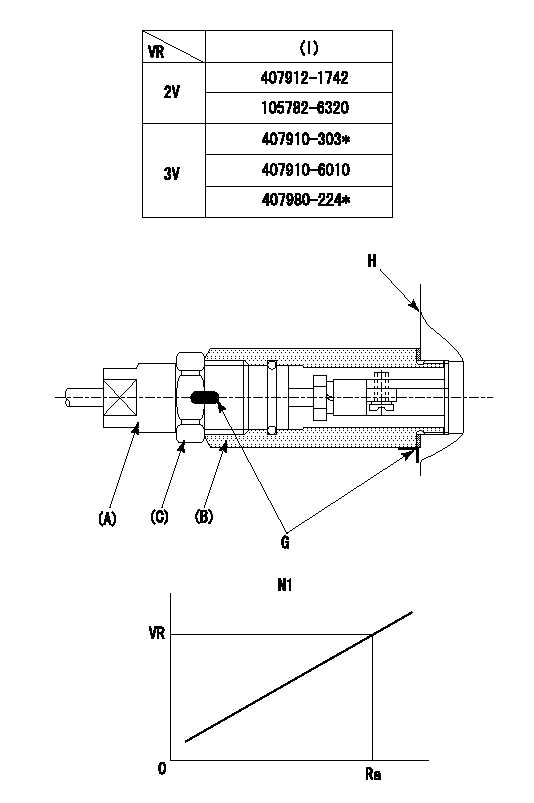
(VR) measurement voltage
(I) Part number of the control unit
(G) Apply red paint.
(H): End surface of the pump
1. Rack sensor adjustment (-0620)
(1)Fix the speed control lever at the full position
(2)Set the speed to N1 r/min.
(If the boost compensator is provided, apply boost pressure.)
(3)Adjust the bobbin (A) so that the rack sensor's output voltage is VR+-0.01.
(4)At that time, rack position must be Ra.
(5)Apply G at two places.
Connecting part between the joint (B) and the nut (F)
Connecting part between the joint (B) and the end surface of the pump (H)
----------
N1=1350r/min Ra=R1(13)+1.55mm
----------
----------
N1=1350r/min Ra=R1(13)+1.55mm
----------
Information:
Fuel Injection Nozzles
Test/Clean/Replace
The engine will be damaged if a defective fuel injection nozzle is used because of the shape of fuel (spray pattern) that comes out of the nozzles will not be correct.
Fuel injection nozzles are subject to tip wear as a result of fuel contamination. This damage can cause an increase in fuel consumption, the engine to emit black smoke, misfire or run rough. Inspect, test and replace if necessary.Whenever the engine performs in such a manner that a fuel injection nozzle is suspected of causing irregular running, smoking or knocking, each fuel injection nozzle must be isolated, one at a time, to determine the malfunctioning nozzle. Special tooling is required to remove fuel injection nozzles. Refer to the Service Manual or contact your Caterpillar dealer for fuel injection nozzle testing and cleaning procedures.Turbocharger
Periodic inspection and cleaning is recommended for the turbocharger compressor housing (inlet side) and the aftercooler core. Since the crankcase fumes are ingested through the inlet air system, oil and combustion by-products may collect in these two areas.This buildup, over time, can contribute to loss of engine power, increased black smoke, and overall loss of engine efficiency. This buildup is only a possible contributor to these conditions.Operating the engine until the turbocharger fails can severely damage the turbocharger's compressor wheel and/or the engine. Damage to the turbocharger compressor wheel could allow parts from the compressor wheel to enter the engine cylinder, causing additional damage to the piston, valve, and cylinder head.
Turbocharger bearing failures can cause large quantities of oil to enter the air inlet and exhaust systems. Loss of engine lubricant can result in serious engine damage.When a turbocharger bearing failure is accompanied by a significant engine performance loss (exhaust smoke or engine speed up at no load), DO NOT continue engine operation until the turbocharger is repaired or replaced.
Minor leakage of a turbocharger housing under extended low idle operation will not cause problems as long as no turbocharger bearing failure occurred.Inspect for Proper Operation
Turbocharger components require precision clearances and balancing due to operation at high rotational speeds. Severe Service Applications can accelerate component wear and may suggest the need to Inspect/Repair/Replace the cartridge at reduced intervals to ensure maximum reliability and retention of full core value.The following conditions can indicate severe service operation.* Frequent high altitude operation above 5,000 ft (1525 m).* Arctic operation (regular cold starts at temperatures below 0°C [32°F]).* Extending lubrication and inlet air system maintenance intervals. 1. Remove the exhaust outlet piping (1) and inlet piping (2) from the turbocharger. Visually check for oil leaks.2. Turn the compressor wheel and turbine wheel by hand. The assembly should turn freely. Inspect the compressor wheel and turbine wheel for contact with the turbocharger housing. There should NOT be any visible signs of contact between the turbine or compressor wheel and the turbocharger housing. If there is any indication of contact between the rotating wheel(s) and the housing, the turbocharger should be reconditioned or replaced.3. Use a dial indicator to check end
Test/Clean/Replace
The engine will be damaged if a defective fuel injection nozzle is used because of the shape of fuel (spray pattern) that comes out of the nozzles will not be correct.
Fuel injection nozzles are subject to tip wear as a result of fuel contamination. This damage can cause an increase in fuel consumption, the engine to emit black smoke, misfire or run rough. Inspect, test and replace if necessary.Whenever the engine performs in such a manner that a fuel injection nozzle is suspected of causing irregular running, smoking or knocking, each fuel injection nozzle must be isolated, one at a time, to determine the malfunctioning nozzle. Special tooling is required to remove fuel injection nozzles. Refer to the Service Manual or contact your Caterpillar dealer for fuel injection nozzle testing and cleaning procedures.Turbocharger
Periodic inspection and cleaning is recommended for the turbocharger compressor housing (inlet side) and the aftercooler core. Since the crankcase fumes are ingested through the inlet air system, oil and combustion by-products may collect in these two areas.This buildup, over time, can contribute to loss of engine power, increased black smoke, and overall loss of engine efficiency. This buildup is only a possible contributor to these conditions.Operating the engine until the turbocharger fails can severely damage the turbocharger's compressor wheel and/or the engine. Damage to the turbocharger compressor wheel could allow parts from the compressor wheel to enter the engine cylinder, causing additional damage to the piston, valve, and cylinder head.
Turbocharger bearing failures can cause large quantities of oil to enter the air inlet and exhaust systems. Loss of engine lubricant can result in serious engine damage.When a turbocharger bearing failure is accompanied by a significant engine performance loss (exhaust smoke or engine speed up at no load), DO NOT continue engine operation until the turbocharger is repaired or replaced.
Minor leakage of a turbocharger housing under extended low idle operation will not cause problems as long as no turbocharger bearing failure occurred.Inspect for Proper Operation
Turbocharger components require precision clearances and balancing due to operation at high rotational speeds. Severe Service Applications can accelerate component wear and may suggest the need to Inspect/Repair/Replace the cartridge at reduced intervals to ensure maximum reliability and retention of full core value.The following conditions can indicate severe service operation.* Frequent high altitude operation above 5,000 ft (1525 m).* Arctic operation (regular cold starts at temperatures below 0°C [32°F]).* Extending lubrication and inlet air system maintenance intervals. 1. Remove the exhaust outlet piping (1) and inlet piping (2) from the turbocharger. Visually check for oil leaks.2. Turn the compressor wheel and turbine wheel by hand. The assembly should turn freely. Inspect the compressor wheel and turbine wheel for contact with the turbocharger housing. There should NOT be any visible signs of contact between the turbine or compressor wheel and the turbocharger housing. If there is any indication of contact between the rotating wheel(s) and the housing, the turbocharger should be reconditioned or replaced.3. Use a dial indicator to check end